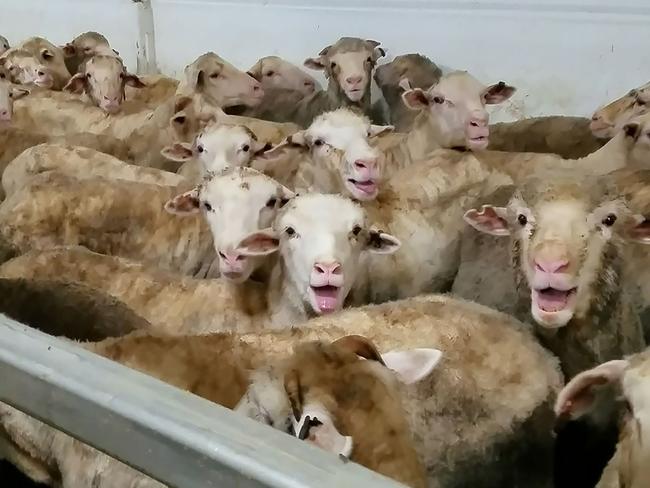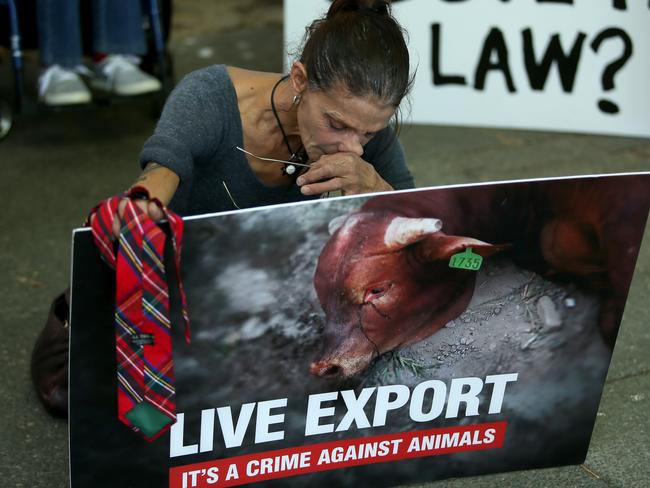Ed Gannon: Shift in animal export horror tactics but demand won’t go away
WHILE the intentions of Animals Australia in highlighting the horrific cruelty in the live sheep trade may be honourable, it is a pressure group that is not dedicated to both sides of the story, writes Ed Gannon.
Opinion
Don't miss out on the headlines from Opinion. Followed categories will be added to My News.
IT has been almost impossible to miss the horrific images of cruelty in the live sheep trade this week. The footage of barbaric filth and dead or suffering sheep shown on 60 Minutes on Sunday could be met only with revulsion.
LIVE EXPORT SHEEP DEATHS SPARK CRACKDOWN
60 MINUTES FOOTAGE SHOWS LIVE EXPORT HORROR
But what many may have missed is what appears to be a subtle change of tactics from Animals Australia in its campaign to rid Australia of the live animal export industry.
First, the footage didn’t come from a covert operation carried out by one of their own who gained access in a way that might or might not be illegal.
It came from an insider, a whistleblower, who couldn’t bear to see such cruelty to the animals. This gave the footage legitimacy.
Secondly, though I don’t know whether Animals Australia first offered the footage to its natural bedfellow, the ABC, particularly Four Corners, its use of 60 Minutes was a clever change of tack.
60 Minutes reporter Liam Bartlett said his report was a “joint investigation” with Animals Australia. It gave Animals Australia cover as a legitimate and unbiased investigative outfit. While its intentions may be honourable, Animals Australia is a lobby and pressure group that is not dedicated to both sides of the story.

I suspect 60 Minutes was chosen by Animals Australia because it wanted to get to a new audience.
The ABC audience is most likely already in furious agreement that live exports should be banished.
The 60 Minutes audience of suburban mums and dads is the one that now needs turning.
There was also the pointed reference in the report that farmers ought to be angry about the treatment of the animals. While no farmers featured in the report, few would disagree. It appeared a subtle but clear push to get farmers to call for an end to live animal exports.
This is a change in direction. And a clever one.
Then came the call from the RSPCA for the government to basically subsidise farmers in return for ending live exports.
It means farmers won’t lose out, which counters the argument from farm groups in defending the trade.
And finally, a study released on Tuesday, amid the fallout, found that shutting the live animal export trade would have a “negligible” impact on farmers’ incomes. The study, conducted by
Pegasus Economics and commissioned by Animals Australia, found the live-export trade delivers less than $2000 to a West Australian farmer, or 0.5 per cent of total income.

That completes the circle. Expose the cruelty, get the masses and the farmers on side, let the RSPCA raise the possibility of bailing out farmers, then show the trade doesn’t actually do much for farmers’ bottom line anyway.
You have to hand it to Animals Australia.
It is a fine-tuned machine.
But what hasn’t been addressed is that this is a demand-driven business. Middle East customers demand live sheep so they can be slaughtered according to religious practices. They can’t produce the sheep locally, so rely on imports.
The same is true of live cattle exports to Asia. It is religion, and a lack of refrigeration in
many areas, that drives the demand for live cattle.
The problem is if Australia pulls out, these customers will seek live animals from elsewhere. And while it won’t be our problem any more, it will be a problem for sheep from another country.
Australia’s live-export industry has been saying for years it has the highest standards in the world.
If so, going on what we saw the other day, standards elsewhere must be pretty bloody awful.
The real issue is not Australia’s supply of the sheep, but the reasons driving customer demand at the other end. And those customers probably don’t really care what Animals Australia says.
Ed Gannon is publisher of The Weekly Times


